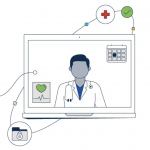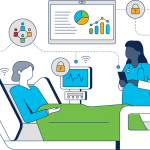As more and more provider networks turn to accountable care organizations, a greater emphasis is being placed on telemedicine for care management. At Cisco Live 2013 this week, we’re seeing this trend manifest as the focus of many of our healthcare customers turns to improving patient access to care and transforming the clinician experience.
One such customer is Nemours Children’s Hospital. Today, Bernie Rice, chief of information technology at Nemours demonstrated how physicians and specialists are able to collaborate over distance to examine patients, bringing care regardless of where the patients are located. Through a series of demos, attendees witnessed firsthand the connection of a physician in a hospital directly to a patient at her home, as well as the interaction of physician, nurse and patient all located in three different locations.
The demo illustrated how a remote physician can listen to a heartbeat, receive vitals—blood pressure and temperature— and interact with patients through high definition video. Other capabilities include the ability to view ultrasound images, look into the ear canal and examine magnified images of skin.
Key to this collaboration is Cisco HealthPresence 2.5. More than video for telehealth, HealthPresence 2.5 adds third-party medical devices, third-party applications and services and workflow features for a complete telehealth solution that delivers healthcare services anytime, anywhere. The software acts as a conduit for transmitting unmodified medical information end-to-end, supporting easy-to-access, high-quality patient care, and facilitating collaboration among licensed healthcare professionals across the healthcare continuum.
You may be asking yourself how practical is this in the real-world? Extremely. Not only will physicians be able to connect to patients remotely, hospitals will be able to extend the reach of specialists, making specialty-based care available to a larger population through the use of compatible medical devices and video consultations. Using telemedicine to coordinate post-operative care will save readmission costs of post-operative patients by providing follow-up care remotely. And in the future, we see this as a means to assist employers to improve their employees’ health and wellness as well as manage healthcare expenses. Telehealth services can achieve these objectives by bringing specialty care to campus clinics and extending services to smaller campuses.
Have you benefitted from telehealth? How would your life change if you could see a doctor from your desk? Let us know in the comments section below.


CONNECT WITH US